新目标八年级英语上册 Unit 6 最新名师预习学习复习指导材料
初中英语人教新目标八年级上册Unit 6重点知识(重点语块+词形变换+重点句子)

八年级英语上册Unit 6重点知识Section A【重点语块】1.grow up长大;成熟;成长2.practice doing sth.练习做某事3.go to university/college 去上大学4.study math really hard 努力学习数学5.be good at...擅长于……6.a famous writer一位著名的作家7.keep on doing sth.继续做某事8.of course当然9.be sure about确信;对……有把握10.make sure确保;查明11.try one's best尽某人最大的努力12.move to...搬到……13.take acting lessons上表演课14. a race car driver一名赛车手15. send sb. sth./ send sth.to sb.寄给某人某物;寄某物给某人16.want sb. to do sth.想要某人做某事17. become an engineer成为一名工程师18.go to a cooking school去烹饪学校19. study medicine at a university在一所大学学医20.write articles写文章21. send them to magazines and newspapers把它们寄到杂志社和报社22. computer programmer编程人员23. see a doctor看医生24.get an education受教育25. a successful pilot一名成功的飞行员【词形变换】1. program n.程序;节目 v.编写程序→programmer n.程序员2.cook n.厨师v.烹饪→ cooker n.炊具3.violinist n.小提琴手→ violin n.小提琴4.pianist n.钢琴家→ piano n.钢琴5. scientist n.科学家→ science n. 科学→scientific adj.科学的cation n.教育→ educate v.教育→educational adj.有教育意义的→educated adj.受过教育的;有教养的→educator n.教育家;教育工作者7.worry v.担心;担忧→ worried adj.焦虑的;担心的→ worrying adj.令人担忧的;令人发愁的8.medicine n.药;医学→medical adj.医学的9.send v.邮寄;发送→sent (过去式)10.drive v.驾驶;开车→ driver n.驾驶员;司机【重点句子】1.—What do you want to be when you grow up ?1一I want to be an engineer.—你长大后想当什么?—我想当一名工程师。
新目标八年级英语上册 Review of Units 1-6最新名师预习学习复习指导材料

Review of Units 1-6▲预习学习复习指导Section A P.37-P.401.比较下列说法a teacher一个女老师→some women(woman×) teachers一些女老师但是a girl student一个女生→some girl(girls×) students一些女生说明:一个名词作修饰语修饰另一个名词(即一个名词作定语)时的数,具体要求如下:⑴一个名词作修饰语修饰另一个名词时,一般用单数。
例:1)some apple(apples×) trees 一些苹果树2)the twin(twins×) bothers 那对双胞胎兄弟3)a shoe(shoes×) factory(工厂) 一家鞋厂4)eye(eyes×) exercises 眼操⑵woman和man俩个词作修饰语修饰另一名词时,要和所修饰的名词的数保持一致。
例:a man doctor →some men(man×) doctors但是a boy student →some boy(boys×) students⑶少数词(如sports等)作修饰语修饰另一个名词时,常只用复数形式。
例:a sports meeting 运动会2.use v. 用,使用,利用;n. 使用;用途→useful adj.有用的;useless adj.无用的——use sth. to do sth. 使用某物干某事:We use milk to make cheese.——make (good) use of …(充分)利用……:We must make good use of our time.3.比较:sick adj.“生病的”,即可作表语又可作定语。
ill作adj,“生病的”与sick同义,但只可作表语。
例:1)He is sick. =He is ill.2)He is a sick man. 不可说He is an ill man. ×4.begin的用法级与start的区别⑴begin的用法:begin(began; begun) v. 开始→biginning 可作n. 开始;开头;开端——begin doing sth. (to do sth.)开始干某事——begin with …以……开始:The word “arm” begins with the letter “a”.⑵begin与start的比较:两者作“开始”时常可通用,start doing sth./to do sth. =begin doing sth./to do s但以下几种意思只可用start :①表示“出发”,“动身”,“启程”时:We will start at 7:00 tomorrow morning.②表示“(机器)开始工作”,“(机器)运转”:The car doesn’t start.③表示“发动(机器)”,“使(机器)运转”:I can’t start the car.----------------------------------------------------------------------------------------------------------------------④表示“创办”,“开办”,“建立”:They want to start a newspaper.5.比较:exciting adj. 令人激动的/兴奋的/刺激的:The news is exciting.excited adj. (感到)激动的/兴奋的/刺激的:We are excited at/about news.——b e excited at/about …对……感到兴奋——be excited to do sth. 干某事很激动/兴奋:We are excited to see the reporter.——be excited that(从句) …. :I’m very excited (that) we are taking a vacation. 6.safe adj. 安全的→safety n. 安全。
【人教版】新目标版八年级上英语:unit6知识点扫描期末复习学案

Un it 6 I ' m going to study computer scie nee一、知识点1. Different kinds of professions(职业)computer programmmer cook doctor nurse engin eer teacher violi nist driver soldier pia nist (basketball) player scie ntist actor/actress waiterfarmer writer reporter pilot musicia n magicia n policema n/policewoma n worker postma n firefighter babysitter artist con ductor shopkeeper salesma nclerk lawyer judge model poet guide bookseller sailor manager directorphotographor pain ter dan cer sin ger secretary2. 询问职业:What do you do? What are you? What' s your job?3. grow up 成长;长大4. a race car driver 6. get a lot of exercise 多锻炼7. write down 9. study medici ne at a uni versity 在大学学医11. New Year ' s resolution®年的决心一个赛车手5. the coming year来年写下;记下8. physical health身体健康10. take medic ine.吃药12. eat healthier food吃更健康的食物13. give the meaning ofresolutio n 解释决心的含义14. make the soccer team 组建足球队15. a cooking school 一所厨师学校16. another foreign Ianguage 另一门外语17. at the beginning of 在…开始时18. at the end of 在…结束时/的终点19. What do you want to be whe n you grow up?(vi)生长;发育Vegetables here grow well. He grows taller.growl 逐渐变得;渐渐He grew old. He grew to like his job.(vt)种植People grow rice in South Chi na.留长;蓄长(头发、胡须等I ' ve dicided to grow my hair.grow up 长大;成长grow in to... 长成He has grown into a young man20. I ' m going to keepn writing stories 我将继续写故事。
新目标英语八年级上Unit6单元复习教学设计
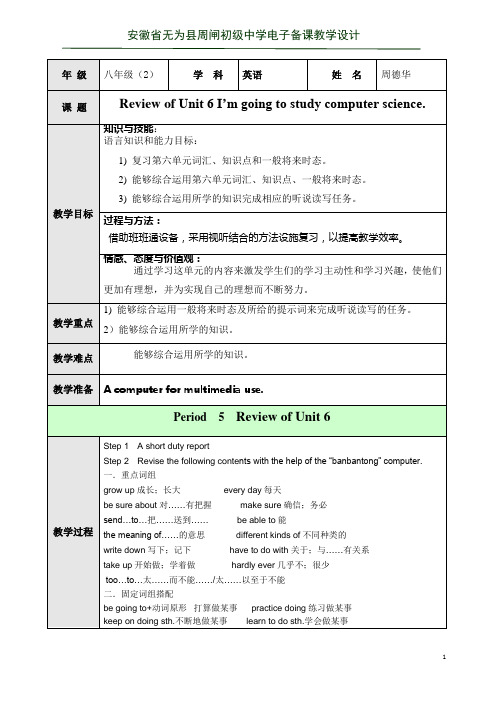
agree to do sth.同意做某事love to do/doing sth.喜爱做某事
want to do sth.想要做某事
三.核心知识点
1.practice v.练习.实习。后面多跟名词(词组)或v-ing形式作宾语。如:
过程与方法:
借助班班通设备,采用视听结合的方法设施复习,以提高教学效率。
情感、态度与价值观:
通过学习这单元的内容来激发学生们的学习主动性和学习兴趣,使他们更加有理想,并为实现自己的理想而不断努力。
教学重点
1)能够综合运用一般将来时态及所给的提示词来完成听说读写的任务。
2)能够综合运用所学的知识。
教学难点
What shall I do?我怎么办呢?
How many books will they get?他们将有多少本书?
三.will, be going to …, be to…, be about to…的区别
1.be going to +不定式,表示将来。表示打算、准备做的事或即将发生或肯定要发生的事。be going to和will相比,be going to通常表示主观,will通常表示客观。
如: I shall not come if it rains tomorrow.如明天下雨我就不来。
My father will leave for China next week.我的爸爸下星期要到中国去
“I’ll, You’ll, He’ll , She’ll , It’ll, We’ll , They’ll …”是简缩形式。
4.Agree同意
八年级英语上册Unit 6知识点及练习题(新版新目标)
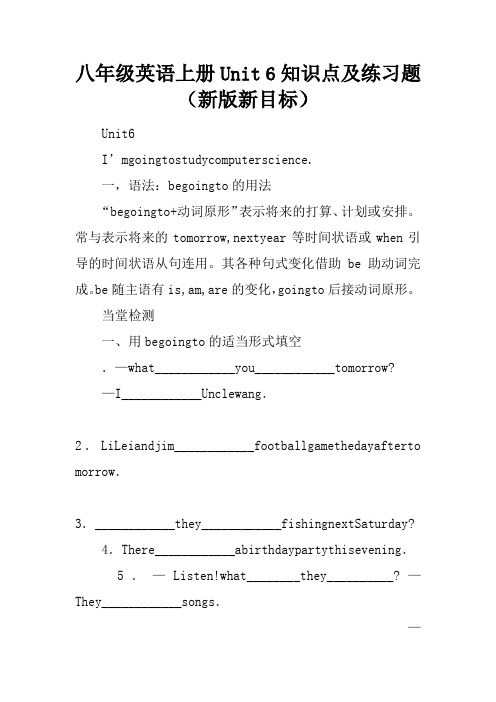
八年级英语上册Unit 6知识点及练习题(新版新目标)Unit6I’mgoingtostudycomputerscience.一,语法:begoingto的用法“begoingto+动词原形”表示将来的打算、计划或安排。
常与表示将来的tomorrow,nextyear等时间状语或when引导的时间状语从句连用。
其各种句式变化借助be助动词完成。
be随主语有is,am,are的变化,goingto后接动词原形。
当堂检测一、用begoingto的适当形式填空.—what____________you____________tomorrow?—I____________Unclewang.2.LiLeiandjim____________footballgamethedayafterto morrow.3.____________they____________fishingnextSaturday?4.There____________abirthdaypartythisevening.5.—Listen!what________they__________?—They____________songs.—Thenwhat____________they____________thisafternoon?—They____________somethingformrLi.6.what_______you_________nextFriday?7.where________they_________somefruit?8.LinTao_________________japanesenextterm.二.单项选择1.Thetrain______________infiveminutes.A.isgoingtogoB.isgoingc.willgoingD.goes2.—whereisjimgoingtomove?He’sgoingto______________Newyork.A.movedtoB.movedc.moveD.moveto3.—There___________aconcertthisevening.—yeah.Excitingnews!A.aregoingtobeB.isgoingtobec.isgoingtohaveD.willhave4..Ihaveadream.whenI___________,Iwanttobeascientist.A.makeupB.comeupc.growupD.turnup5.Iwanttomoveto___________.A.interestingsomewhereB.somewhereinterestingc.interestingwhereD.whereinteresting二、句型转换。
【人教版】新目标八年级英语上册:Unit6单元说课稿

【人教版】新目标八年级英语上册:Unit6单元说课稿一. 教材分析人教版新目标八年级英语上册Unit6主要围绕着“节日”这一主题展开,通过学习本单元,学生能够掌握关于节日的词汇和表达方式,了解不同国家的节日习俗,提高自己的跨文化交际能力。
教材内容丰富,包括主课文、语法、听说、读写等多个部分,旨在全面提升学生的英语综合运用能力。
二. 学情分析八年级的学生已经具备了一定的英语基础,对于学习新的词汇和表达方式有一定的掌握。
但同时,学生在语法、听说、读写等方面的能力参差不齐,需要针对性地进行教学设计。
此外,学生对于不同国家的文化背景了解有限,需要通过课堂拓展来提高他们的跨文化交际意识。
三. 说教学目标1.知识目标:学生能够掌握关于节日的词汇和表达方式,了解不同国家的节日习俗。
2.能力目标:学生能够运用所学知识进行简单的跨文化交际,提高自己的英语口语表达能力。
3.情感目标:培养学生对不同文化的尊重和理解,拓宽国际视野。
四. 说教学重难点1.重点:掌握关于节日的词汇和表达方式,了解不同国家的节日习俗。
2.难点:运用所学知识进行实际的跨文化交际,提高英语口语表达能力。
五. 说教学方法与手段1.交际法:通过模拟真实场景,让学生在实际语境中运用所学知识进行交流。
2.任务型教学法:通过完成各种任务,激发学生的学习兴趣,提高他们的实践能力。
3.多媒体教学手段:运用PPT、视频等教学辅助材料,丰富课堂形式,提高学生的学习积极性。
六. 说教学过程1.导入:以一段关于节日的视频导入,激发学生的学习兴趣,同时引导学生思考:你们知道哪些节日?最喜欢哪个节日?2.新课呈现:通过PPT展示本节课的主要内容,包括节日词汇和表达方式,不同国家的节日习俗等。
3.课堂实践:模拟真实场景,让学生分组进行角色扮演,运用所学知识进行跨文化交际。
4.语法讲解:针对本节课的语法点,进行详细的讲解和示例,让学生在理解的基础上进行运用。
5.听力训练:播放一段关于节日的听力材料,学生听后进行问答,检查学生对听力材料的理解程度。
人教版新课标八年级上册英语Unit 6知识点归纳

人教版新标八年级上册英语Unit 6知识点归纳人教版新标八年级上册英语Unit6知识点归纳Unit6I’reutgingthansister【复习目标】●谈论个性特征●学会使用形容词的比较级比较人的个性特征●学会比较身边的事物并选择最佳方案【语言目标】●IsthatSa?N,that’sT,HehasshrterhairthanSaHe’salerthanSa【语言结构】●比较级-er,-ier,re的使用●bth的用法【重点词汇】●re,than,/reathleti,reppular,/tin,bth,begdat●taller,shrter,thinner,lnger,heavier,aler,ilder,quie ter,funnier,sarter【应掌握的词组】lnghair长头发2Hareu?你身体好吗?3Hld多大年纪4htall多高hlngag多久前(的事)6reutging比较外向7ant/plantdsth意欲,企图8herearephtsfe这是我的照片9asuansee正如你所看到的0inseas在某些地方1elthesae我们看起来一样,Theldifferent他们看起来不同2thesaet……多……是一样的3quitethesae完全一样4allthesae还是,同样应……llie看起来像…一样,而lthesae看起来很像6gtltsfparties经常参加聚会=ftengtthepart7alittletaller高一点8taesthfrsth从某处拿/取出某物9putsthinsth将某物放入某物中20aealistf列出清单21hasllthes有漂亮的衣服22isppularinshl在学校受欢迎23isgdatsprts擅长体育24aeelaugh使我发笑2that’sntveriprtantfre那对我来说并不重要26putup举起,抬起,挂起,张贴,建造;putn穿上,戴上,上演(戏剧);putdn=ritedn=pdn写下来;putut伸出,扑灭;putaa收起来,收好;putff推迟;putne’sheartint…全神贯注于……,全身心投入……27ppsitevies相反的观点28aeeendteaher周末教师29AbausStudenter珠算研究中心30eleentarshlstudents小学生31begdithhildren善于与孩子相处32havegdgrades成绩出色33entellinges喜欢讲笑话34an’tstptaling不能停止讲话3helpthers帮助别人,helpeahther互相帮助36inne’sfreetie在业余时间37nef+复数名词(代词)……其中之一38usesthtdsth=dsthithsth使用…做…39be/feelsrrfrsb为某事感到同情或难受;be/feelsrrfrsth因某事感到抱歉或后悔;besrr+tsee/hear听到或看到某种情况很不安或难过;sasrrtsb向某人道歉40beginith从……开始41nextt在……旁边,紧靠……42befausfr因…而著名,因……而广为人知;befausas作为……而知名43alltgether总计,总共44aesbdsth让/使某人做某事,相似的用法有几个感官动词see,let,hear,ath,feel等【应该掌握的句子】.hatareudingfrvaatin?I’babsittingsister假期你要做什么?我要照顾我的妹妹。
人教新目标英语八年级上册Unit6单元知识点归纳总结
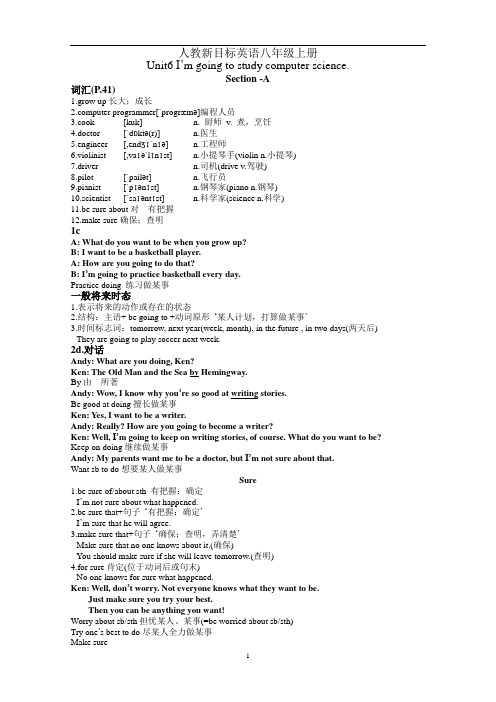
人教新目标英语八年级上册Unit6 I’m going to study computer science.Section -A词汇(P.41)1.grow up长大;成长puter programmer[`progræmə]编程人员3.cook [kuk] n. 厨师v. 煮,烹饪4.doctor [`dɒktə(r)] n.医生5.engineer [,endʒɪ`nɪə] n.工程师6.violinist [,vaɪə`lɪnɪst] n.小提琴手(violin n.小提琴)7.driver n.司机(drive v.驾驶)8.pilot [`pailət] n.飞行员9.pianist [`pɪənɪst] n.钢琴家(piano n.钢琴)10.scientist [`saɪəntɪst] n.科学家(science n.科学)11.be sure about对---有把握12.make sure确保;查明1cA: What do you want to be when you grow up?B: I want to be a basketball player.A: How are you going to do that?B: I’m going to practice basketball every day.Practice doing 练习做某事一般将来时态1.表示将来的动作或存在的状态2.结构:主语+ be going to +动词原形‘某人计划,打算做某事’3.时间标志词:tomorrow, next year(week, month), in the future , in two days(两天后) --They are going to play soccer next week.2d.对话Andy: What are you doing, Ken?Ken: The Old Man and the Sea by Hemingway.By由---所著Andy: Wow, I know why you’re so good at writing stories.Be good at doing擅长做某事Ken: Yes, I want to be a writer.Andy: Really? How are you going to become a writer?Ken: Well, I’m going to keep on writing stories, of course. What do you want to be? Keep on doing继续做某事Andy: My parents want me to be a doctor, but I’m not sure about that.Want sb to do想要某人做某事Sure1.be sure of/about sth 有把握;确定--I’m not sure about what happened.2.be sure that+句子‘有把握;确定’--I’m sure that he will agree.3.make sure that+句子‘确保;查明,弄清楚’--Make sure that no one knows about it.(确保)--You should make sure if she will leave tomorrow.(查明)4.for sure肯定(位于动词后或句末)--No one knows for sure what happened.Ken: Well, don’t worry. Not everyone knows what they want to be.Just make sure you try your best.Then you can be anything you want!Worry about sb/sth担忧某人、某事(=be worried about sb/sth)Try one’s best to do尽某人全力做某事Make sureAndy: Yes, you’re right.词汇(P.43)1.college [`kɒlɪdʒ] n.大学(高等专科)cation [,edʒu`keɪʃn] n.教育(educational adj.教育的)3.medicine [`medisn] n.医学;药(take some medicine吃些药)4.university [,ju:nɪ`vɜ:səti] n.大学(综合性)5.London 伦敦6.article [`a;tikl] n.文章;冠词7.send [send] v.邮寄;送8.resolution [,rezə`lu:ʃn] n.决定;决心9.team [ti;m] n.队;组10.foreign [`fɒrən] adj.外国的(foreigner n.外国人)2a.句子连线1.-My friend wants to be an engineer. A. She’s going to study maths.2.-My brother wants to be an actor. B. He’s going to take acting lessons. Take acting lessons上表演课(动名词作定语)3.-I want to be a scientist. C. I’m going to study science.4.-My sister wants to be a school teacher. D. She’s going to study education. Education n.教育educational adj.教育的5.-Those boys want to be soccer players. E. They’re going to practice every day.6.-My friend and I want to be singers. F. We’re going to take singing lessons. Take singing lessons上唱歌课(动名词作定语)7.-My cousin wants to be a cook. G. He’s going to go to a cooking school. Cooking school烹饪学校(动名词作定语)8.-I want to be race car driver. H. I’m going to buy a fast car.3c.对话A: What do you want to be when you grow up?B: I want to be a reporter.A: How are you going to do that?B: I’m going to write articles and send them to magazines and newspapers.Send sth to sb / sp把某物邮寄给某人或邮寄到某地Send sb to sp把某人送到某地Section B1e.对话(P.44)A: I want to be a teacher.B: How are you going to do that?A: Well, I’m going to study hard and get good grades.Get good grades取得好成绩B: Sounds like a good plan. I want to get a lot of exercise.Exercise练习1.She__________(plan) to fly to Beijing yesterday.2.You need some__________(exercise) to keep healthy.3.Can you get a cup of tea______ Lucy?A. forB. toC. of4.I often go to the __________(read) room.5.My brother is an__________(act) and my sister is an__________(act), too.6.Those films are__________(education).7.I bought a cat______ her.A. forB. toC. of8.That sounds______.A. funnyB. funnily9.How often do you write a letter______ them?A. forB. toC. of10.They______me to air the room.A. wantB. letC. make词汇(P.45)1.able [eɪbl] adj.能够的(unable adj.不能的)2.be able to do能够做某事(=can do)3.question v.提问,质问4.meaning n.意思(mean v.意思是meaningless adj.无意义的meaningful adj.有意义的)5.discuss [dɪ`skʌs] v.讨论,商量(discussion n.讨论,商量)6.promise [`prɒmɪs] n.承诺v.承诺7.beginning n.开端,开头(begin v.开始)8.at the beginning of在---的开始9.improve [im`pru:v] v.改进;改善(improvement n.改进,改善)10.write down写下;记录下11.physical [`fizikl] adj.身体的12.themselves pron.他们自己13.have to do with与---有关14.self-improvement n.自我改进(提高)15.take up开始做16.hobby [`hɒbi] n.爱好17.weekly adj./adv. 每周的(地)18.schoolwork n.功课19.agree [ə`gri:] v.同意,赞成(agreement n.同意)20.agree with同意,赞成21.own adj.自己的(owner n.物主)22.personal [`pəsnl] adj.个人的(person n.人)23.relationship [rɪ`leɪʃnʃɪp] n.关系,联系2b.阅读短文1.Do you know what a resolution is?宾语从句:特殊疑问句要用陈述句语序It’s a kind of promise.A kind of一种Most of the time, we make promises to other people. (‘Mum, I promise I’m going to tidy my room when I get back from school.’)Most of the time大部分时间Get back to返回Promise1.promise sb sth = promise sth to sb承诺某人某事--She promised the money to her grandson.2.promise to do承诺做某事--They promised to get there on time.3.make a promise (make promises) to do 承诺做某事--He made promises to help them.However, promises you make to yourself are resolutions, and the most common kind is New Year’s resolutions.The most common最普通的The start of the year is often a time for making resolutions.Time for---的时间When we make resolutions at the beginning of the year, we hope that we are going to improve our lives.Make resolutions做决定Begin1.begin with由---开始--My class often begins with English songs.2.At the beginning of在---的开始3.in the beginning首先(=at first)Some people write down their resolutions and plans for the coming year.Plan for---的计划This helps them to remember their resolutions.Others tell their family and friends about their wishes and plans.2.There are different kinds of resolutions.Different kinds of不同种类的Some are about physical health.For example, some people promise themselves they are going to start an exercise program or eat less fast food.For example例如Many resolutions have to do with self-improvement.Have something to do with和---有一些关系Have nothing to do with和---没有关系For example, a student may have to find more time to study.Some people might say they are going to take up a hobby like painting or taking photos, or learn to play the guitar.Some resolutions have to do with better planning, like making a weekly plan for schoolwork. Make a plan for制定---的计划These are about making yourself a better person.3.Although there are differences, most resolutions have one thing in common.Have one thing in commonPeople hardly ever keep them!There are good reasons for this.Reason for---的原因Sometimes the resolutions may be too difficult to keep.To keep不定式作状语时无需宾语,因为句子的主语就是动词keep的形式上的宾语Sometimes people just forget about them.For this reason, some people say the best resolution is to have no resolutions!For this reason由于这种原因How about you—will you make any next year?Agree1.agree with sb 同意某人的建议2.agree to do同意做某事3.disagree不同意Exercise练习1.Do you know______?A. where is she fromB. where they liveC. what’s the weather like2.It’s time__________(have) Chinese class now.3.Drinking less can help__________(keep) us healthy.4.We can’t stand by when ______ are in trouble.A. otherB. othersC. the otherD. the others5.Remember__________(bring) my shoes to school tomorrow.6.They are learning__________(play) the guitar.7.The most important thing is__________(learn) something new.8.Don’t forget__________(close) the windows.9.The resolutions may be too difficult to keep.(变同义句)The resolutions may not be__________ __________ to keep.10.She often makes me__________(clean) my own bedroom.。
人教新目标八年级英语上Unit 6 I’m going to study computer science.复习课导学案
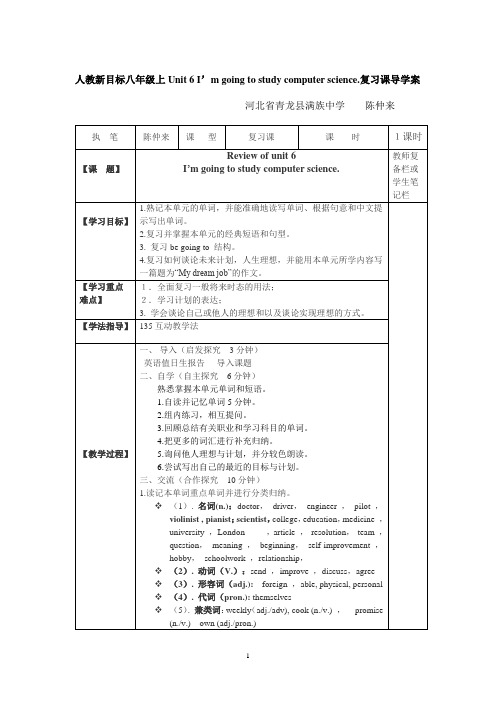
promisesth.许诺去做某事
help sb.sth.帮助某人做某事
remembersth.记住做某事
agreesth.同意做某事
lovesth.喜爱做某事
短语实战:
1. My father kept on ______ (smoke) though we wanted him to stop it.
【学习目标】
1.熟记本单元的单词,并能准确地读写单词、根据句意和中文提示写出单词。
2.复习并掌握本单元的经典短语和句型。
3.复习be going to结构。
4.复习如何谈论未来计划,人生理想,并能用本单元所学内容写一篇题为“My dream job”的作文。
【学习重点难点】
1.全面复习一般将来时态的用法;
2. Mother isn’t a _______. But she can ______ delicious food for us. ( cook)
3. Grace likes playing the _______. She wants to be a_____.(violin)
4. The old ________ tells us how to learn _______well. (science)
9.write down_______________________
10.have to do with_______________________
11.take up_______________________
12.hardly ever_______________________
13.too…to…_______________________
八年级英语Unit6;Topic1预习导纲

八年级英语Unit6;Topic1预习导纲八年级unit6 topic1 预习导纲一词汇1.重点单词section a: field vehicle task airplane airline decide total raise discusssection b: cinema hotel refrigerator fridge standard conditioncomfortable personsection c: common dollar sell noon top forward2.重点词组section a: go on a visit to… make a decisionfind out (留意与find的区分) over/on the phone decide on go on the spring field tripthe best way to dosection b: arrive at/in pay formake a …reservation plan tosection c: word out ask sb. for …come up with at noonput on a show at the weekendthe top of decide to dolook fordward to ( doing ) hear fromsection d: have a rest in the open air see the sunrise have a wonderful time as soon as in the daytime have a big dinner二句子新课标第一网xkb〔一〕重点句子1.i have some exciting news to tell you.2.it will take us a few days to get there by bike.留意句型:it takes/took/will take sb. …to do.3.let’s find out some info rmation about the cost.4.your task is to find out the cost by bus.5.the best way to get there is by ….6.we have tickets at 145 yuan for the hard sleeper. 留意介词at 和for 在此处的用法。
人教版新目标英语八年级上册Unit6复习
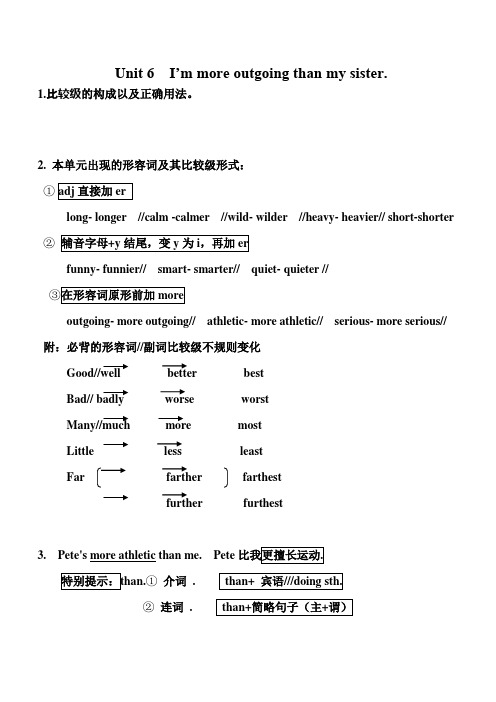
Unit 6 I’m more outgoing than my sister.1.比较级的构成以及正确用法。
2. 本单元出现的形容词及其比较级形式:①long- longer //calm -calmer //wild- wilder //heavy- heavier// short-shorter②funny- funnier// smart- smarter// quiet- quieter //outgoing- more outgoing// athletic- more athletic// serious- more serious// 附:必背的形容词//副词比较级不规则变化Good//well better bestBad// badly worse worstMany//much more mostLittle less leastFar farther farthestfurther furthest3. Pete's more athletic than me. Pete①介词.②连词.4.我们两个人都高,并且我们俩都是长卷发。
都可译为"都、、、全部、、、",区别如下:Both. ''(两个)都.....''//"(两者)都......" 位置:be//情态//助动之后;实义动词之前All ''(三个或三个以上)都.....''// 位置:be//情态//助动之后;实义动词之前5.I am a little quieter ,but Vera is much more outgoing .A little 修饰quieter much修饰more outgoing为了语言表达的需要,有时我们会在a little // much// even//......细心体会:Lily is a little funnier than her sister. LilyAn elephant is much heavier than a hen.That movie star gets even more beautiful than before.6. P33. 3a短文:尽管我的头发比她的短点。
人教新目标英语八年级上册Unit6单元必考知识点总结

人教新目标英语八年级上册Unit6 I’m going to study computer science.一.基本单词:Computer programmer计算机程序设计员cook 厨师engineer 工程师doctor 医生teacher老师violinist 小提琴家bus driver 公交车司机pilot 飞行员pianist 钢琴家basketball player篮球球员scientist 科学家actor 演员基本词组:grow up成长;长大every day每天be sure about对……有把握make sure确信;务必send…to…把……送到…… be able to能the meaning of……的意思different kinds of不同种类的write down写下;记下have to do with关于;与……有关系take up开始做;学着做hardly ever几乎不;很少too…to…太……而不能……/太……以至于不能二.用法集萃:be going to+动词原形打算做某事practice doing练习做某事keep on doing sth.不断地做某事learn to do sth.学会做某事finish doing sth.做完某事promise to do sth.许诺去做某事help sb. to do sth.帮助某人做某事remember to do sth.记住做某事agree to do sth.同意做某事love to do sth.喜爱做某事want to do sth.想要做某事三.重点句子1.What do you want to be when you grow up? 你长大后打算做什么?2.How are you going to do that? 你打算怎样去做呢?I am going to practice basketball every day. 我打算每天练习篮球。
八年级英语上册Unit6I’mgoingtostudycomputerscience基础知识必背手册(新版)人教新目标版
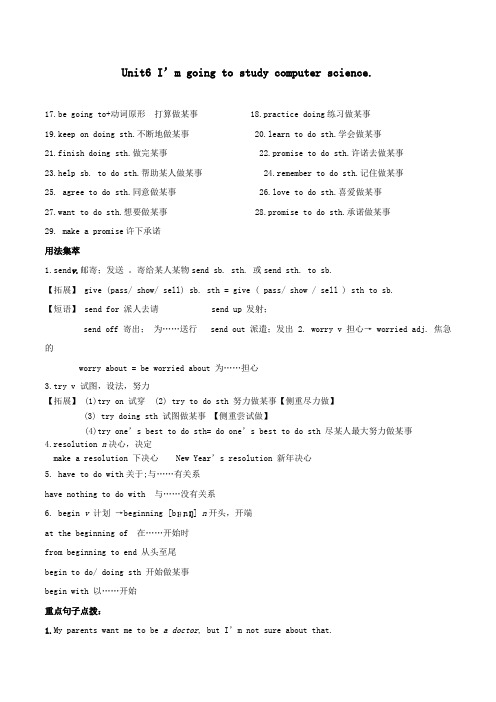
Unit6 I’m going to study computer science.17.be going to+动词原形打算做某事 18.practice doing练习做某事19.keep on doing sth.不断地做某事 20.learn to do sth.学会做某事21.finish doing sth.做完某事 22.promise to do sth.许诺去做某事23.help sb. to do sth.帮助某人做某事 24.remember to do sth.记住做某事25. agree to do sth.同意做某事 26.love to do sth.喜爱做某事27.want to do sth.想要做某事 28.promise to do sth.承诺做某事29. make a promise许下承诺用法集萃1.send v.邮寄;发送。
寄给某人某物send sb. sth. 或send sth. to sb.【拓展】 give (pass/ show/ sell) sb. sth = give ( pass/ show / sell ) sth to sb.【短语】 send for 派人去请 send up 发射;send off 寄出;为……送行 send out 派遣;发出 2. worry v 担心→ worried adj. 焦急的worry about = be worried about 为……担心3.try v 试图,设法,努力【拓展】 (1)try on 试穿 (2) try to do sth 努力做某事【侧重尽力做】(3) try doing sth 试图做某事【侧重尝试做】(4)try one’s best to do sth= do one’s best to do sth 尽某人最大努力做某事4.resolution n决心,决定make a resolution 下决心 New Year’s resolution 新年决心5. have to do with关于;与……有关系have nothing to do with 与……没有关系6. begin v计划→beginning [bɪɡɪnɪŋ] n开头,开端at the beginning of 在……开始时from beginning to end 从头至尾begin to do/ doing sth 开始做某事begin with 以……开始重点句子点拨:1.My parents want me to be a doctor, but I’m n ot sure about that.点拨1:doctor n医生 see the doctor 看医生at the doctor’s 在诊所点拨:2:sure adj. 确信的;be sure about 确信; make sure 确保(1) be sure +about / of +名词、代词或动名词对……有把握She is sure of success. 她确信会成功。
新目标英语八年级上册第6单元知识点总结[免费专享]
![新目标英语八年级上册第6单元知识点总结[免费专享]](https://img.taocdn.com/s3/m/5dacb40e7c1cfad6185fa739.png)
Unit6I ’m going to study computer science 话题:讨论未来的事情与规划一学习目标:1.知目○1 法一般未来○2 句型a. What do you want to be when ⋯?当⋯⋯ 你想成什么?b. I want to be ⋯我想成⋯⋯c. How are you going to do ⋯?你将怎样做⋯⋯d. I am going to ⋯我将要⋯⋯e. Where are you going to ⋯你将去哪儿⋯⋯ ?f. I am going to ⋯我姜武⋯⋯g. When are you going to ⋯你将何⋯⋯ ?h. I am going to ⋯ when当⋯⋯ 我将⋯⋯○3短grow up 成;大every day 每日be sure about ⋯⋯有掌握make sure确信;必send⋯ to⋯把⋯⋯送到⋯⋯be able to能the meaning of ⋯⋯的意思different kinds of 不一样种的write down 写下;下have to do with 对于;与⋯⋯相关系take up开始做;学着做hardly ever 几乎不;极少too⋯ to⋯太⋯⋯而不可以⋯⋯ /太⋯⋯以致于不可以be going to+ 原形打当作某事practice doing 做某事keep on doing sth. 不停地做某事learn to do sth.学会做某事finish doing sth. 做完某事promise to do sth. 去做某事help sb. to do sth.帮助某人做某事remember to do/doing sth. 住做某事agree to do sth.赞同做某事love to do/doing sth. 喜做某事want to do sth. 想要做某事○4二感情目每一个人都有自己的梦想和未来的打算,于未来想要从事的也充了向往。
- 1、下载文档前请自行甄别文档内容的完整性,平台不提供额外的编辑、内容补充、找答案等附加服务。
- 2、"仅部分预览"的文档,不可在线预览部分如存在完整性等问题,可反馈申请退款(可完整预览的文档不适用该条件!)。
- 3、如文档侵犯您的权益,请联系客服反馈,我们会尽快为您处理(人工客服工作时间:9:00-18:30)。
1 八年级英语上册Unit 6 I ’m outgoing than my sister.【10—1】预习学习复习指导 201110▲学习目标 1.学会谈论个性特征;2.学习使用形容词的比较级比较人的特征;3.学会比较身边的事物并选择最佳方案。
▲预习学习复习指导(一)Section A P.30-P.331.twin n. 双胞胎之一;adj. 双胞胎的,孪生的:The twin(twins ×) brothers are outgoing.2.wild adj. ①鲁莽的,轻率的;②狂野(暴,怒,热,疯)的;③野(生,性)的3.serious adj. ①严肃的,认真的;②庄重的;③严重的,厉害的 →seriously adv.4.note n. 注释,说明;笔记;短信;便条;纸币5.动词mean 的用法:mean (meant/ment/; meant) v. 作…解,表示…的意思,意思是,意思指,意味着例:1)What does the word “finally ” mean? —It means “at last ”.2)What do you mean? 你是什么意思?3)What do you mean by saying that ?你通过说那表示什么意思?你说那话是什么意思?4)Whom do you mean? 你指的是谁?说明:①mean 是动词,决不可误用为名词!其名词形式是meaning 。
如:What is his mean? ×→What does he mean? 或What is his meaning?②mean 是动词,其“单三”形式是means 。
另外,means 还可作名词:方法,手段;工具。
具体用法见Unit 4第10条。
6.way 的用法见Unit 2第12条7.both 的用法:both pron.&adj. 两者(都);两个(都)。
可以单用,也可以与名词或代词连用。
与名词或代词连用时的搭配结构具体如下:①both + 复数名词: There are many shops on both sides(边,侧,面) of the street.②both + 限定词 + 复数名词:Both his parents are teachers.③both + of + 限定词 + 复数名词:Both of his parents are teachers. 还可以说:His parents are both teachers.比较:all (三者/三者以上都)与名词或代词连用时的搭配结构与上述类似。
8.more than + 数量词 =over … 见Unit 5 第12条。
9.common adj. ①共同的,共有的;②普通的,常见的——in common 共同(的),共有(的)----------------------------------------------------------------------------------------------------------------------2八年级英语上册Unit 6 I ’m outgoing than my sister.【10—2】预习学习复习指导 201110例:1)Liu Li and Liu Ying have some things in common . ……有一些共同之处。
2)The two have nothing in common . 这两者没有共同之处。
10.——be good at + sth./doing sth. ①对……学/做得好,在……方面成绩(=do well in …)②擅长……例:1)He is good at math. =He does well in math.2)His father is good at fishing.11.复习:enjoy v. 喜爱;欣赏;享受(……的乐趣)——enjoy doing sth(to do sth.×)——enjoy oneself =have fun, have a good tim▲预习学习复习指导(二)Section B & Self Check P.34-P.3612.laugh v. 笑;发笑;大笑;n. 笑;笑声:laugh at … 嘲笑……比较:smile v. 微笑;n. 微笑;笑容:smile at … 讥笑……例:1)He came in with a laugh. 他(大)笑着进来了。
(指带着笑声)比较:He came in with a smile. 他笑着(面带笑容)进来了。
(指带着笑容) 2)We mustn ’t laugh(smile) at other people.13.opposite ①adj. 相反的;相对的:——be opposite to ,,, 与……相反/相对②n. 相反的人或事物;反义词③prep. 在……的对面(=across from …):They live opposite the post office.14.interest 的用法:⑴ n. 兴趣,趣味——不可数;爱好——可数 ——with (great) interest 带着(极大)兴趣例:They are drawing with great interest.——show (great) interest in … 对……表现出(极大)兴趣例:He shows great interest in science.——places of interest 名胜⑵ v. 使……感/产生兴趣:The book interests me.⑶ interesting 可作adj. 令人感兴趣的→有趣的interested 也可作adj. 感到有趣的,感兴趣的——be interested in ,,, 对……感兴趣例:The book is interesting . I’m interested in it.15.though 的用法----------------------------------------------------------------------------------------------------------------------3 八年级英语上册Unit 6 I ’m outgoing than my sister.【10—3】预习学习复习指导 201110⑴ conj. 虽然,即使,纵然(=although )——引导让步状语从句,不可与并列连词but 连用。
例:1)Though we were very tired, we kept working.2)I will try it though I may fail(失败). ⑵ adv. 可是,不过,然而——通常放于句末,且前面常用逗号与句子其它成分隔开。
例:1)He said he would come, he didn ’t, though.2)I have a bit of a cold. It ’s nothing much, though.16.比较:beat + 人/队 v. 打败/击败/战胜……。
反义:——lose to … 输给……例:He always beats me in tennis.win + 比赛/奖品 v. 赢得,获得……。
还可单用,意思为:获胜。
反义:lose*play + 人/队 v. 和……比赛例:1)Who are you going to play? —I ’m going to play Jim.2)They will play the Beijing team in volleyball.另外,还可跟运动或比赛之类的n.,表示“进行”。
如:play soccer; play a (football)game; play a friendly match 举行友谊赛。
17.care 的用法⑴ v.(从重要性、兴趣、忧虑等上)关心,忧虑,在意,计较。
多用于否定句或疑问句。
后面常跟介词about ,即:care about …, 但是单用或后跟一个句子时通常要省 略介词about 。
例:1)I don ’t care about other people ’s opinions.2)He doesn ’t care about his clothes.3)I don ’t care whether(是否) it rains . 4)We don ’t care how far we will have to go .5)I ’ll never speak to you again. —I don ’t care.——care about … (见以上各例)⑵ n. 关心;忧虑;注意;照看——take care 小心,当心,注意,谨慎(=be careful)——take care of ,,, 照顾,照料,照看;关心,注意(=look after );负责18.——make sb. do sth. 使得某人干某事(不可说make sb. to do sth. ×)说明:let, make, have(使), watch, see, hear, notice(注意到), feel(感觉;觉得)等动词带不定式作宾补时,不定式必须省to 。
又如:He let us go home.(不可说He let us to go home. ×)。
但可以说:get sb. to do sth. 使得某人干某事(=make/have sb. do sth.)19.重要句型:What do you like about …? 关于…你喜欢什么?你喜欢关于…的什么?例:1)What do you like about him? —I like his build(体格,体型). 2)What does Mary like about the coat? —She likes its color.----------------------------------------------------------------------------------------------------------------------4 八年级英语上册Unit 6 I ’m outgoing than my sister.【10—4】预习学习复习指导 201110注意:What do you like about …? ≠How do you like …?(你认为/觉得…怎么样?)例:1)What do you like about China? —I like its people and food.2)How do you like China ? (=What do you think of China ?)—It ’s great! I like it very much.20.secret [ˊsi: krit] n. 秘诀;;诀窍;秘密——It ’s a secret. 那是一个秘密。
